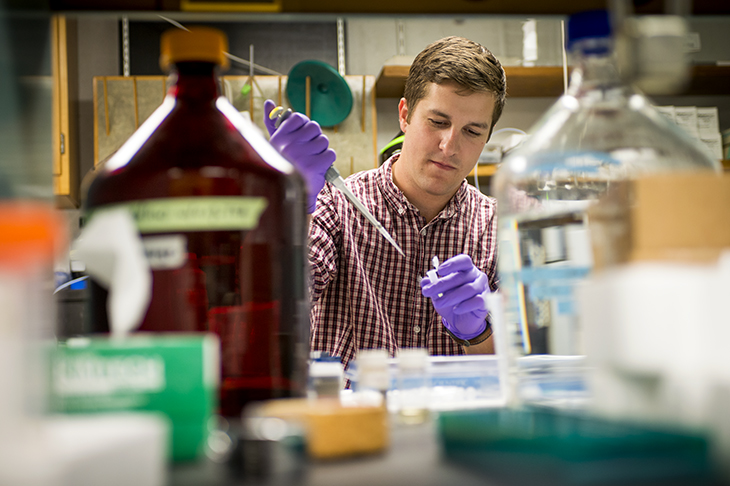Little discoveries mean big things for treatment

With a three-year Ruth L. Kirschstein National Research Service Award from the National Cancer Institute, doctoral candidate Taylor Fuselier is looking for peptides that can pass through cell membranes to aid drug delivery of therapeutics normally unable to enter the interior of a cell. (Photo by Ryan Rivet)
The best minds in research work to find cures to our deadliest diseases. But what if those miracle cures weren"t able to reach the part of cells that needed them most?
Tulane University School of Medicine doctoral candidate Taylor Fuselier is working to find ways for those life-saving cures to make the most impact.
“This is a very general type of drug delivery,” Fuselier said. “I like to think that we"re offering a Swiss Army knife for other researchers to aid in delivering their drugs.”
Under the guidance of biochemistry professor William C. Wimley, Fuselier works to find peptides that aid in delivering compounds that normally would not enter cells. Wimley"s lab searches for sequences of amino acids that interact with cell membranes. Fuselier is looking for peptides that can pass through cell membranes to aid drug delivery of therapeutics normally unable to enter the interior of a cell.
Fuselier said that the Wimley lab"s research can have a broad impact on a variety of diseases from cancer to blood infection.
“I hope that one day a cancer researcher can use the peptides we discover to aid his research,” Fuselier said. “Discoveries in basic science are very important. I feel like we are doing something that no one else is doing.”
For his work, Fuselier has received a three-year Ruth L. Kirschstein National Research Service Award from the National Cancer Institute. These highly selective and prestigious grants are different from typical research grants in that they focus on training and education in the research environment.
Fuselier says that training he has received from Wimley and the experience in his lab contributed to the grant award.
Kirby Messinger is a communication/marketing officer in the Office of Development Communications.
